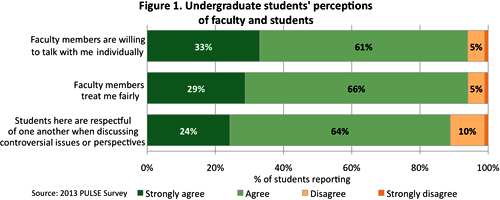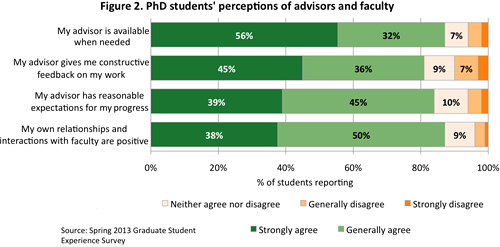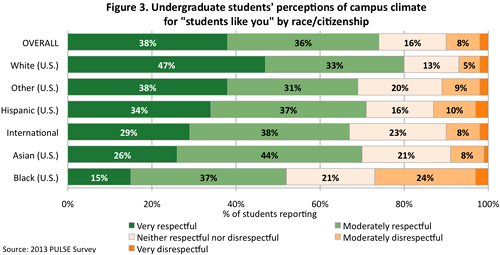Survey report analyzes campus climate for students
By Nancy Doolittle
How comfortable students feel at Cornell depends on their backgrounds and social identities, an analysis of three recent campus surveys shows. The analysis notes that most Cornell students are actively engaged in activities related to their academic endeavors and have positive perceptions of their Cornell experience. But the degree to which students feel included, respected and safe on campus varies significantly depending on their social identities: their race, ethnicity or citizenship; gender identity; sexual orientation; family income; religious affiliation; political views; or disability status.
The analysis is summarized in a report by Cornell’s Institutional Research and Planning office, created in consultation with the University Diversity Council (UDC). The campus climate assessment supports the ongoing work of the UDC and was one of the recommendations from a team of staff and students who met last fall following a series of reported sexual assaults and bias incidents on campus.
“Understanding how the learning environment in all its dimensions enhances or constrains students’ abilities to achieve their educational goals is extremely important to Cornell and to the national dialogue on educational success,” said President David Skorton. “Our ongoing assessment of campus culture at Cornell will inform our actions related to diversity and contribute to the broader discussion.”
“The Toward New Destinations diversity planning project provides us with a roadmap for addressing broad campus culture concerns,” said Laura Brown, senior vice provost for undergraduate education and co-chair of the UDC. “The analysis of the student surveys will be a valuable tool as we continue to assess and address our core areas of engagement and inclusion.”



The analysis drew on an expanded and modified version of last spring’s PULSE (Perceptions of Undergraduate Life and Student Experiences) survey of undergraduate students; and two surveys conducted by the Graduate School: the Graduate Student Exit Survey of master’s degree students and the Graduate Student Experience survey of Ph.D. students. Participants answered questions about their engagement in academic, co-curricular, social and diversity-related activities; and their sense of belonging or inclusion based on the perceived quality of their interactions with peers, faculty members and administrators.
“While the graduate student community is my particular focus, I believe it is important for us to understand how all our students perceive and experience the campus from their own perspectives and social groups, and for us to identify areas where we can improve the campus climate in ways that will enhance the educational experience,” said Barbara Knuth, vice provost and dean of the Graduate School.
Detailed survey results about students’ engagement and inclusion have been organized into dashboards, which are available here: http://irp.dpb.cornell.edu/university-factbook/diversity. Overall, the analysis reveals:
- Undergraduate and graduate students are actively engaged academically, especially in their interactions with faculty and advisers, and their involvement in assistantships and research.
- The majority of Cornell students have positive perceptions of their Cornell experience. Most are satisfied with the social life and level of ethnic/racial diversity on campus. Most feel they receive fair treatment from faculty and advisers, and are treated with respect by their fellow students. Figures 1 and 2 provide examples of these perceptions.
- Students’ backgrounds or social identities are significantly associated with their assessments of campus climate: Students from historically less-represented groups are more actively involved in diversity-related activities, and have less positive experiences and perceptions of campus climate than their peers from traditionally dominant groups. Figure 3 provides an example of these conclusions from the perspective of race and citizenship.
- Among those having the least positive assessments of campus climate are students identifying as black; students identifying as transgendered or gender-variant, queer, gay, lesbian or bisexual; and students from low-income backgrounds.
- Women Ph.D. students feel less safe and valued at Cornell than their colleagues.
- International and underrepresented U.S. minority graduate students are more likely to feel they have to work harder for legitimacy than their peers.
- Students at all levels and all social identities perceive micro-climates on campus more positively than they do the broader campus climate, with many able to find “a community on campus where I feel I belong.”
The full report, “Beginning to Assess the Student Climate for Diversity at Cornell: Preliminary Findings on Student Engagement and Inclusion From Student Surveys,” can be found at http://irp.cornell.edu/diversity-reports.
According to Brown, Sylvia Hurtado, professor and director of the Higher Education Research Institute at UCLA in the Graduate School of Education and Information Studies, and a leading scholar of diversity in higher education, will visit campus this fall to review the survey results and conduct interviews and focus groups. “Extending the information that this report has generated, Professor Hurtado will provide an independent qualitative study of student engagement and inclusion, which we will share with the Cornell community during the spring 2014 semester,” Brown said.
Media Contact
Get Cornell news delivered right to your inbox.
Subscribe